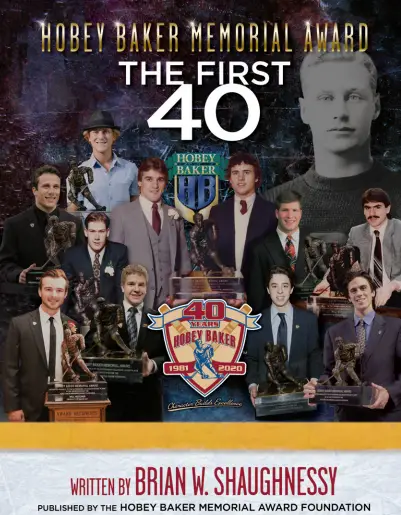Brian Shaughnessy said he had always been intrigued by the Hobey Baker Award.
So much, in fact, that the Massachusetts native recently penned a book, Hobey Baker Memorial Award: The First 40, featuring the award’s first 40 winners, starting with Minnesota’s Neal Broten in 1981 and ending with Minnesota Duluth’s Scott Perunovich in 2020.
“I am the same age as the award, and as an avid college hockey fan growing up in Eastern Massachusetts in the 1980s and 1990s, I noticed how the Hobey Baker Award grew in popularity over time,” Shaughnessy said. “I believe the creation of U.S. College Hockey Online played a role in the growth of the Hobey, as beginning in the mid-to-late 1990s, fans in the east could more easily follow the best players in the WCHA and the CCHA, and fans in the west could do the same with Hockey East and the ECAC.
“I was drawn to the Hobey Baker Award in part because the award is not always given to the best or most highly-skilled player in the country. It also takes into account a finalist’s character, sportsmanship, and academic achievements. This adds to the significance of the award, in my opinion.”
The 104-page book, now available on the Hobey Baker Award website for $24.95, is a comprehensive look at college hockey’s top players from the past 40 seasons. It’s a piece of memorabilia that any hardcore fan of the game should have in their collection.
“There were interesting stories behind the hockey careers of the award’s 40 winners which I wanted to explore,” noted Shaughnessy. “The book focuses on each recipient’s collegiate careers while also covering their noteworthy accomplishments in juniors and/or the professional ranks. I began writing the book in 2005 to commemorate the 25-year anniversary of the Hobey Baker Award, but never finished it. I picked up the project again last year, and thanks in large part to the assistance I received from Jim Martin and other members of the Hobey Baker Foundation, I was able to finally complete the book.”

Shaughnessy said he was inspired by the fact that the Hobey Baker Memorial Award Foundation is a 501(c)(3) non-profit corporation, and he wanted to help raise funds for the foundation. All proceeds from the book will benefit the foundation.
In penning the book, Shaughnessy said he learned new and interesting tidbits about the award and players in doing the research for the book.
“I conducted dozens of interviews of former Hobey Baker Award winners, players who competed with and against prior Hobey recipients, and coaches Hobey winners played for during their NCAA careers,” explained Shaughnessy. “The common theme relayed to me in those interviews was the extremely high character level the Hobey winners possessed.
“Furthermore, I wanted to highlight some of the lesser-known feats of the Hobey Baker Award winners.”
Some examples Shaughnessy cited include Neal Broten being the only member of the 1980 U.S. Olympic team to return to college and then completely dominating NCAA hockey in 1980-81 while helping his brother, Aaron, shatter the Minnesota single-season scoring record, the nearly unimaginable statistical dominance of Tony Hrkac and North Dakota in 1986-87 and Paul Kariya and Maine in 1992-93, on up to the singular, transcendent talents of Johnny Gaudreau and Jack Eichel, Cale Makar leading perhaps the most remarkable turnaround of a program in college hockey history, and Perunovich crafting the perfect collegiate career in his three years at Minnesota Duluth.
As well, the book clearly has sentimental value for Shaughnessy.
“I grew up around college hockey and my passion for the game has never left me,” Shaughnessy said. “Some of my favorite memories were attending Hockey East games with my dad when I was younger. I wrote the book for my father to show him how much I appreciated those times together.”
Are there drawbacks to the book? None that I can see. It’s the perfect piece of reference material for the ultimate individual college hockey award.
On a scale of 1-10, this book gets a solid 10. Just an all-around dynamic book that truly has it all. If college hockey is your passion, grab a copy of this book.



